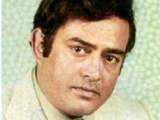A tribute to Sanjeev Kumar on his 70th birth anniversary
Screen celebrates Sanjeev Kumar's 70th birth anniversary falling on July 9 and salutes the sheer range of Sanjeev Kumar's performances.
Born Harihar Jariwala on July 9, 1938, he changed his name to Sanjeev Kumar as he debuted with Hum Hindustani in 1960. A stint in acting school took him to Bollywood. But it was from 1968 when he starred opposite the great Dilip Kumar in Sangharsh that he shot to fame. In 1970 , Khilona launched him in the stellar orbit. Box-office hits like Seeta Aur Geeta and Manchali followed.
He had a fruitful association with noted filmmaker Gulzar from the early 1970s. He featured in as many as nine of Gulzar's films which include Koshish, Aandhi , Mausam , Angoor and Namkeen . His most critically-acclaimed role was that of Mirza, the chess player in Satyajit Ray's classic Shatranj Ke Khiladi . But of course, it's his portrayal as the avenging Thakur in Sholay that remains dear to cinephiles. Trishul was yet another career high for him.
Playing nine different roles way back in 1974 in Naya Din Nayi Raat, Sanjeev Kumar proved his versatility beyond a doubt. In the early 1980s he pitched in withsupporting roles. In 1985, at the age of 47, he died of a heart ailment. Ten of his films were released after his death, Professor Ki Padosan being the last of his releases in 1994. Indeed, it is ironical that the actor who played a senior citizen most convincingly in so many films never really reached that age!
The 30-day marvel
Producer, director B R Chopra relates how Sanjeev Kumar immortalised the role of a flirty husband in Pati Patni Aur Woh
Turning to humour
In 1979, my wife Prakash and I were on a world tour when she chanced upon an interesting Japanese film. The film revolved around a husband and wife and had an interesting theme with the husband having a clandestine affair with his secretary. Taken up by the subject, she narrated it to me on the condition that her name would appear in the credits as the storywriter if we were to make the film. After hearing the story, I was also fascinated by it. But I wanted to give the otherwise serious subject a humorous turn. Since I was known to be a serious filmmaker, what with films like Waqt, Gumraah and Hamraaz behind me, my wife felt that I wouldn't be able to handle comedy well. But I have always believed in experimenting with something novel. So I took up this challenge and along with Kamleshwar, who had a knack for writing light-hearted subjects, worked on the screenplay and dialogues.
Bulk dates, slashed rates
The story is about the happily-married Ranjit (Sanjeev Kumar) who cannot resist the other woman,his young and innocent secretary Ranjeeta. His attempts at laying a trap to ensnare her on the one hand and trying to keep it under cover, gives rise to many hilarious moments. Sanjeev Kumar was the obvious choice for the lead role. As a versatile actor he was unarguably the best. Also a close friend, he had a keen desire to work with me but somehow I could not create a role for him in any of my earlier projects. But in this film he suited the role to a T. When I discussed the project with him, he was thrilled to bits and also gave me bulk dates for 30 days, despite his tight schedule.
However a comedy film was not a hot proposition then, so I expressed my helplessness to pay him his usual rate, that was quite exorbitant. He immediately sorted it all out by suggesting that instead of his usual remuneration, he would just settle for 20 per cent of the overflow if the film was a success. I found the deal satisfactory. As I had not worked with Sanjeev before and was aware about his coming late on the sets, I was a little jittery on this score. But he did not let me down even once throughout the making of the film. Sanjeev was one actor who would give his all to a film. There was a certain understated quality in his acting that gave performance of his that special something. For instance, Sanjeev always opens the coat button once he steps outside his house, symbolising relief at his freedom away from his wife's prying eyes. Sanjeev imbued so much life in that scene that it became one of the highlights of the film.
For the Patni's role, I opted for Vidya Sinha who had earlier worked in Chhotisi Baat which I had produced earlier . She had the looks needed for the character of a housewife and to my surprise, she gave a sterling performance in a role which remains one of her memorable roles till today.
Ranjeeta was impressive in her film Laila Majnu and also had the fresh girl-next-door appeal in her that was needed for the character of the other woman. She too gave a brilliant performance and lived up to my expectations.
Innerwear outscores
We had decided to shoot the song Thande thande pani mein in the bathroom with Sanjeev in bare minimum clothing. Conscious of his figure, Sanjeev immediately went on a diet of boiled vegetables. But being unable to overcome his passion for food, he gained weight than lost the extra pounds. On seeing the rushes of the song Sanjeev insisted that we reshoot it because presumably his mother had not liked it. Though I was completely satisfied with the song, I agreed to reshoot it now with Sanjeev in a lungi and a vest and let him see the results. Thankfully, Sanjeev agreed on retaining the former because that looked better.
Another scene I recollect is where Sanjeev has to catch an early morning flight but discovers that all the clocks and the watches in the house are not working. So he sings a weird song in the middle of the night, thereby waking up his neighbours who unwittingly tell him what the time is while admonishing him for creating a ruckus in the dead of the night. To make the sequence look authentic, I decided to shoot the scene at midnight and somehow got the inmate of the houses near the bungalow to also co-operate. To my amazement, not only did they co-operate by staying awake till the shoot was over, but also agreed to be a part of the shoot. So that scene has the actual neighbouring people in it.
Controversial climax
Believe it or not, the film was completed in a period of only 30 days and that was a record of sorts because matching the stars' dates and completing the post-production work is not so easy. You could call this film a quickie that was also low-budget.
What I like the most about the film is it's climax where Sanjeev just gets out of the Ranjeeta affair, promises his wife to change his flirtatious ways but on entering his office, encounters his new secretary Parveen Babi and is back to his old ways again. This is my favourite scene because I wanted to drive home the message that no man can change his ways overnight. Though many tried to convince me that I should show Sanjeev as a reformed person in the end, I stuck to this climax.
After a private screening, Tarachand Barjatya came upto me and predicted that the film would fail miserably at the box-office since the theme was unsuitable for Indian society. Contrary to that, the film clicked! Released in 1978, the film opened to a weak response but gradually picked up and went on to become one of the top grossers of the year. Sanjeev Kumar was thrilled to bits on seeing the overwhelming response of the audience. As promised, I gave him the 20 per cent of the overflow, which he admitted was much more than he earned from any other film. Also, I kept my promise of giving due credit to my wife as the story writer of the film.
Sequel woes
After the film's tremendous success, we planned to make a sequel, something that had never been attempted in the history of Indian cinema till then. But somehow, the news leaked out and several films were subsequently made on the same subject. Also the unexpected demise of Sanjeev Kumar dampened our spirits. I personally felt that no other actor could have enacted his part in the sequel so convincingly. So I dropped the idea eventually.
Pati Patni Aur Woh is a film whose mere mention is enough to bring a smile on anyone's face. I feel the film's highlight was its screenplay, due to which the film moved at a brisk pace without any dull moment. Also the film's comedy track was fresh as there was nothing slapstick about it.
The success of this film gave me immense satisfaction because I proved that I could do justice to comedy also which was hitherto an uncharted territory for me. The film still lingers in the minds of the viewers and they like to catch its re-runs on the television.



















comment:
p_commentcount